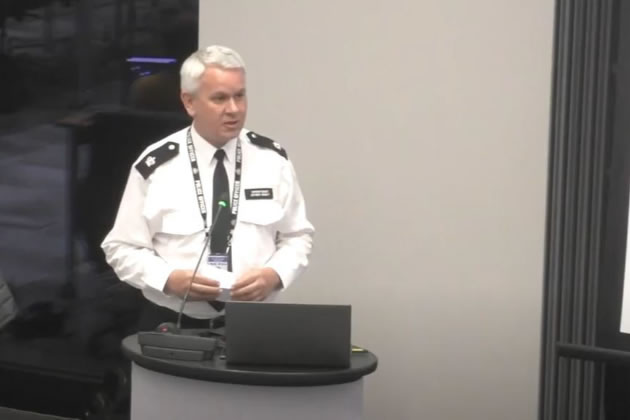Queen's Funeral and Climate Protests Blamed for Reduced Police Presence
Neighbourhood teams shrunk to support emergency response
 Superintendent Anthony Bennett speaking at a recent meeting
Superintendent Anthony Bennett speaking at a recent meeting
A senior police officer in Hounslow Borough has said there have been fewer officers on local streets because of the Queen’s Funeral and protests made by Extinction Rebellion and Just Stop Oil.
IT training is also taking police officers from neighbourhood patrols as they learn to use a new system that will reportedly make the force “more efficient”.
Superintendent Anthony Bennett told councillors and members of the public at the Central Hounslow Area Forum on Thursday (10 November) that a “common complaint” from residents was about a lack of officers on the streets. Superintendent Bennett said making officers more visible on the streets of Hounslow had been a “significant challenge” in the past few months.
This comes after a number of serious incidents on the streets of Hounslow within just one week. On 2 November, a woman in her 60s reported getting raped in an alleyway near Martindale Road, five days later a 14-year-old boy was fighting for his life in hospital after being stabbed outside Tesco on Hanworth Road.
However, the meeting last week revealed that neighbourhood police teams have been shrunk to help protect national events and make sure emergency response teams are fully staffed. In September, thousands of officers were required to police the capital in the week leading up to Queen Elizabeth’s II funeral.
Over the past few months, Extinction Rebellion and Just Stop Oil have shut down roads as part of their protests which they say aim to raise awareness about the climate crisis. These actions required locally-based officers to attend the scene.
The Met is also undertaking a huge IT revamp in which officers need to complete training, again, taking them off the streets. These issues have also taken officers from the neighbouring boroughs of Ealing and Hillingdon, according to Superintendent Bennett.
Superintendent Bennett added, “We’ve also faced challenges around response team resourcing. Some of your neighbourhood officers have had to be used for those cordon incidents and help back response teams. One of our priorities is that we meet that critical demand if someone is ringing for help.”
He reassured residents that officers do remain on the streets, just with different units. He said, “They are out there, they haven’t totally disappeared, there are just not as many out there at the moment as we’d like. Please be rest assured they are out there on the streets doing the work and where there is critical demand we are making sure we are getting officers there and making sure they are policed.
“After some of the incidents we have seen over recent weeks in Hounslow, we’ve been able to flex a number of officers into those locations to provide reassurance as well. So where we need to, we’ve got officers and we will put them in there.”
New Met Police Commissioner Mark Rowley has committed to introducing 1,600 new Police Community Support Officers (PCSOs) into the service, but it is not yet known how many will be in Hounslow.
Superintendent Bennett continued, “Having supervised PCSOs at a sergeant and inspector level, the benefits a PSCO can bring are quite substantial. Also, they get abstracted from their daily roles less than police officers so it should be a more permanent presence on your streets.
“We are expecting some changes to be made very soon and hopefully get more officers, keep them out on the streets doing the business of engaging with the public and keeping your street safe.”
Megan Stanley - Local Democracy Reporter
November 14, 2022